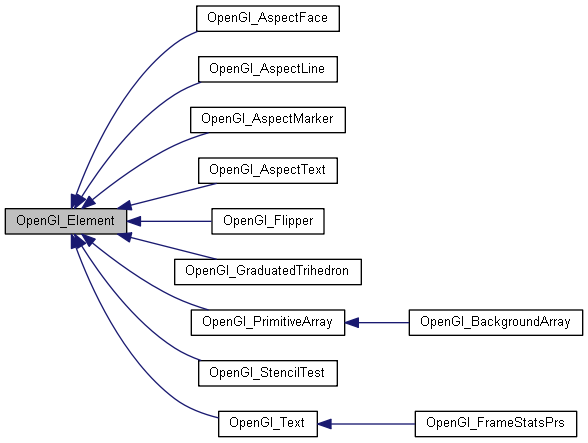Base interface for drawable elements. More...
#include <OpenGl_Element.hxx>

Public Member Functions | |
| OpenGl_Element () | |
| virtual void | Render (const Handle< OpenGl_Workspace > &theWorkspace) const =0 |
| virtual void | Release (OpenGl_Context *theContext)=0 |
| Release GPU resources. Pointer to the context is used because this method might be called when the context is already being destroyed and usage of a handle would be unsafe. More... | |
| virtual Standard_Boolean | IsFillDrawMode () const |
| Return TRUE if primitive type generates shaded triangulation (to be used in filters). More... | |
| Standard_Boolean | RenderFiltered (const Handle< OpenGl_Workspace > &theWorkspace, const Handle< OpenGl_RenderFilter > &theFilter) const |
| Render element if it passes the filtering procedure. This method should be used for elements which can be used in scope of rendering algorithms. E.g. elements of groups during recursive rendering. If render filter is null, pure rendering is performed. More... | |
Static Public Member Functions | |
| template<typename theResource_t > | |
| static void | Destroy (OpenGl_Context *theContext, theResource_t *&theElement) |
| Pointer to the context is used because this method might be called when the context is already being destroyed and usage of a handle would be unsafe. More... | |
Protected Member Functions | |
| virtual | ~OpenGl_Element () |
Detailed Description
Base interface for drawable elements.
Constructor & Destructor Documentation
◆ OpenGl_Element()
| OpenGl_Element::OpenGl_Element | ( | ) |
◆ ~OpenGl_Element()
|
protectedvirtual |
Member Function Documentation
◆ Destroy()
|
inlinestatic |
Pointer to the context is used because this method might be called when the context is already being destroyed and usage of a handle would be unsafe.
◆ IsFillDrawMode()
|
inlinevirtual |
Return TRUE if primitive type generates shaded triangulation (to be used in filters).
Reimplemented in OpenGl_PrimitiveArray.
◆ Release()
|
pure virtual |
Release GPU resources. Pointer to the context is used because this method might be called when the context is already being destroyed and usage of a handle would be unsafe.
Implemented in OpenGl_AspectMarker, OpenGl_AspectFace, OpenGl_Text, OpenGl_AspectText, OpenGl_PrimitiveArray, OpenGl_AspectLine, OpenGl_GraduatedTrihedron, OpenGl_Flipper, OpenGl_FrameStatsPrs, and OpenGl_StencilTest.
◆ Render()
|
pure virtual |
◆ RenderFiltered()
|
inline |
Render element if it passes the filtering procedure. This method should be used for elements which can be used in scope of rendering algorithms. E.g. elements of groups during recursive rendering. If render filter is null, pure rendering is performed.
- Parameters
-
theWorkspace [in] the rendering workspace. theFilter [in] the rendering filter to check whether the element should be rendered or not.
- Returns
- True if element passes the check and renders,
The documentation for this class was generated from the following file:
 1.8.13
1.8.13